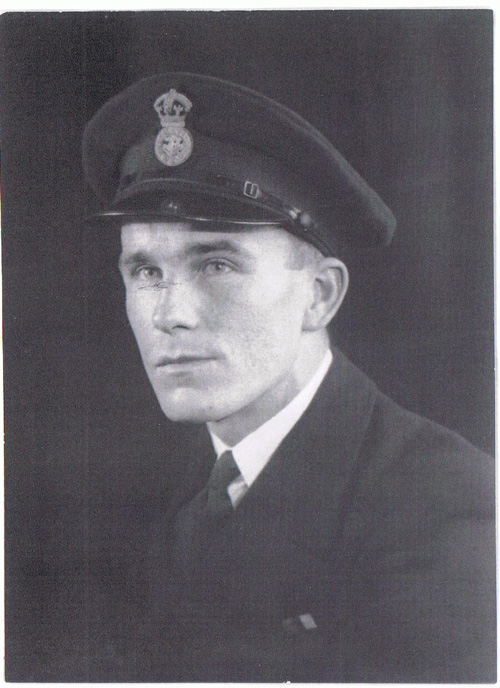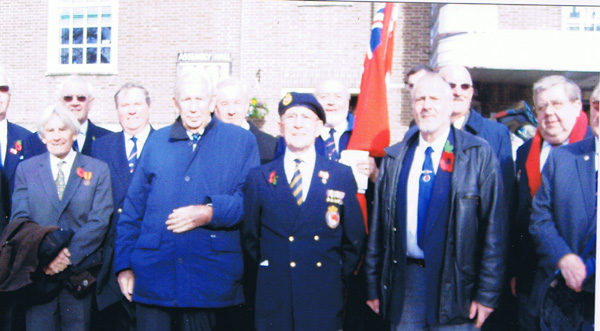|
/back
Robert (Bob) Ball (PWSTS 1941)


 Click
here to read Bob's published letter in the Bexhill Observer 2006 Click
here to read Bob's published letter in the Bexhill Observer 2006
Click
here to see Bob's photo 2007
Click here to see Bob
remembering the boys in 2007
A War Time Story - The First Trippers
On a clear crisp morning on 20th October 1941, in the city of Norwich,
three young lads met at a bus terminal for the first time.
They were John Smith from Walsall Staffordshire, Tom Brennand from
Blackburn Lancashire and Bob Ball from Bexhill-on-Sea Sussex. They
discovered that they were each waiting to catch the same bus that would
take them to the village of Ingham. There they would receive first class
training, second to none in preparation for war time service on deck in
the Merchant Navy. They were all keen for the opportunity to be able to
serve their country in its time of need. They bonded together straight
away and formed a friendship that continued throughout their training
period and for John and Bob a lasting friendship that would continue
throughout both war and post war years for both themselves and their
respective families. On the completion of their intensive training, the
three lads left the school together in 1942 and each joined the very
different ships assigned to them.
Tom Brennand signed on the Blue Funnel Line M.V Stentor a passenger cargo
vessel. His ship was torpedoed on the 27th October 1942, off the Canary
Islands by U Boat 509, Kapitan-Leutnant Witte. From a compliment of 246,
only 201 survivors were picked up by HMS Woodruff. Tragically amongst the
45 who lost their lives was young Tom Brennand, aged fifteen and a half
years old. He had only left the PWSTS a few months earlier. He was an only
child. U Boat 509 was subsequently attacked by aircraft on 15th July 1943
off Madeira. She was sunk losing all hands.
John Smith signed on the Donaldson Line M.V Cortona, a general cargo ship
of 7093 grt, and when outward bound from Liverpool to Buenos-Aires was
torpedoed in the Atlantic in August 1942 by two U Boats U201, Kapitan
Schnee and U116, Kapitan Werner von Schmidt. John spent ten days in a life
boat with twenty three other survivors. They attempted to land fall in the
Canary Islands but were picked up by HMS Pathfinder and landed in
Londonderry. The second life boat launched, commanded by the first mate
and twenty nine crew members were never found.
John being a fit young man, easily shook off this war time experience but
what he did find hard to accept on being paid off at the end of that
unfortunate episode was the discovery that it was general practice of all
shipping companies to stop crew members wages at exactly the time their
ships were sunk beneath them, together with all their possessions, for
which they received no compensation. How very different were American
Seamen treated by contrast when the USA entered the war. Each and every
man was insured by their government for $10,000. Their wages were twice
that of our own on top of which they received bonuses for every theatre of
war in which they sailed, 100% for North & South Atlantic & Mediterranean,
80% for the Pacific and Indian Oceans and 40% for sailing anywhere else.
John Smith carried on with his war time service without any further
mishaps and decided to make seafaring his career and with the help of
friendly bridge officers he studied and passed his Third-Second and First
mates examinations. He finally obtained his Masters Certificate while
serving with Caltex & Texaco Oil Company during which time he took command
of the Texaco Greenwich – London – Britain – and Spain to name but a few.
He retired with his wife Maisie to Eastbourne in 1981 with the rank of
Senior Company Master.
Bob Ball signed on the Union Castle Line Capetown Castle 27,000 grt a 26
knot troop ship which owing to her fast turn of speed sailed unescorted
out of convoy. His first trip as such was almost uneventful by comparison
with that of Tom and John’s experience and he served on a wide variety of
ships there after mostly on Atlantic crossing in convoy. He later took
part in the D Day Normandy landings initially getting Canadian troops from
the Lake Superior Regiment and their equipment successfully onto their
beach head. Then shortly after was engaged in shipping supplies and
equipment to our forces engaged in the push up Italy on the Adriatic Coast
and then with a crossing to Dubrovnic and Split with supplies and weapons
for Tito’s Yugoslavian Chetniks. Bob carried on seafaring after the wars
end for a further two years before leaving the sea to join the family
construction business and later taking up post in Nigeria and the West
Indies. He gained a degree in Civil Engineering and finally retired in
1993 with his wife Ilse in Bexhill-On-Sea.
The number of merchant ships lost during the last war totalled five
thousand one hundred and fifty. Three thousand of which were sunk by U
Boats and fifty thousand merchant seamen from the United Kingdom,
Commonwealth counties, Canada and the USA lost their lives in the service
of their countries. By comparison Germany’s U Boat service lost thirty
five thousand men from a total number of forty thousand.
It was very unfortunate that in 1975 the Prince of Wales training school
was obliged to cease functioning, probably caused by the lack of requested
from shipping companies for fully trained boys wishing to take up a career
at sea. This is mainly due to the shrinking size of our post war merchant
fleets and the practice of shipping companies generally registering their
ships under various flags of convenience in order to cut costs. Plus the
practise of engaging untrained and cheaper crews from various parts of the
world who were prepared to work under lower standards and conditions than
those enjoyed on ships flying the Red Duster.
Bob Ball

|